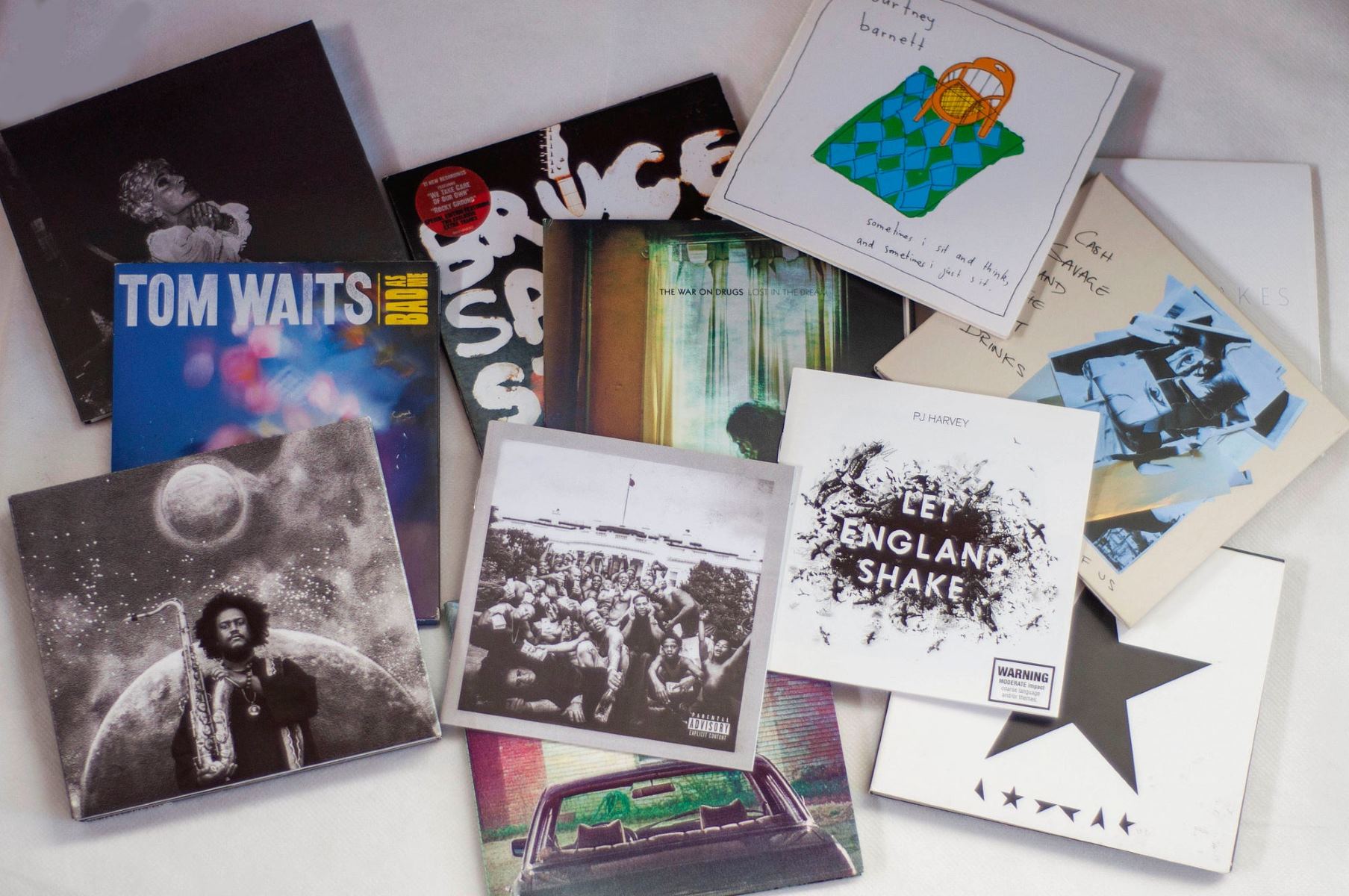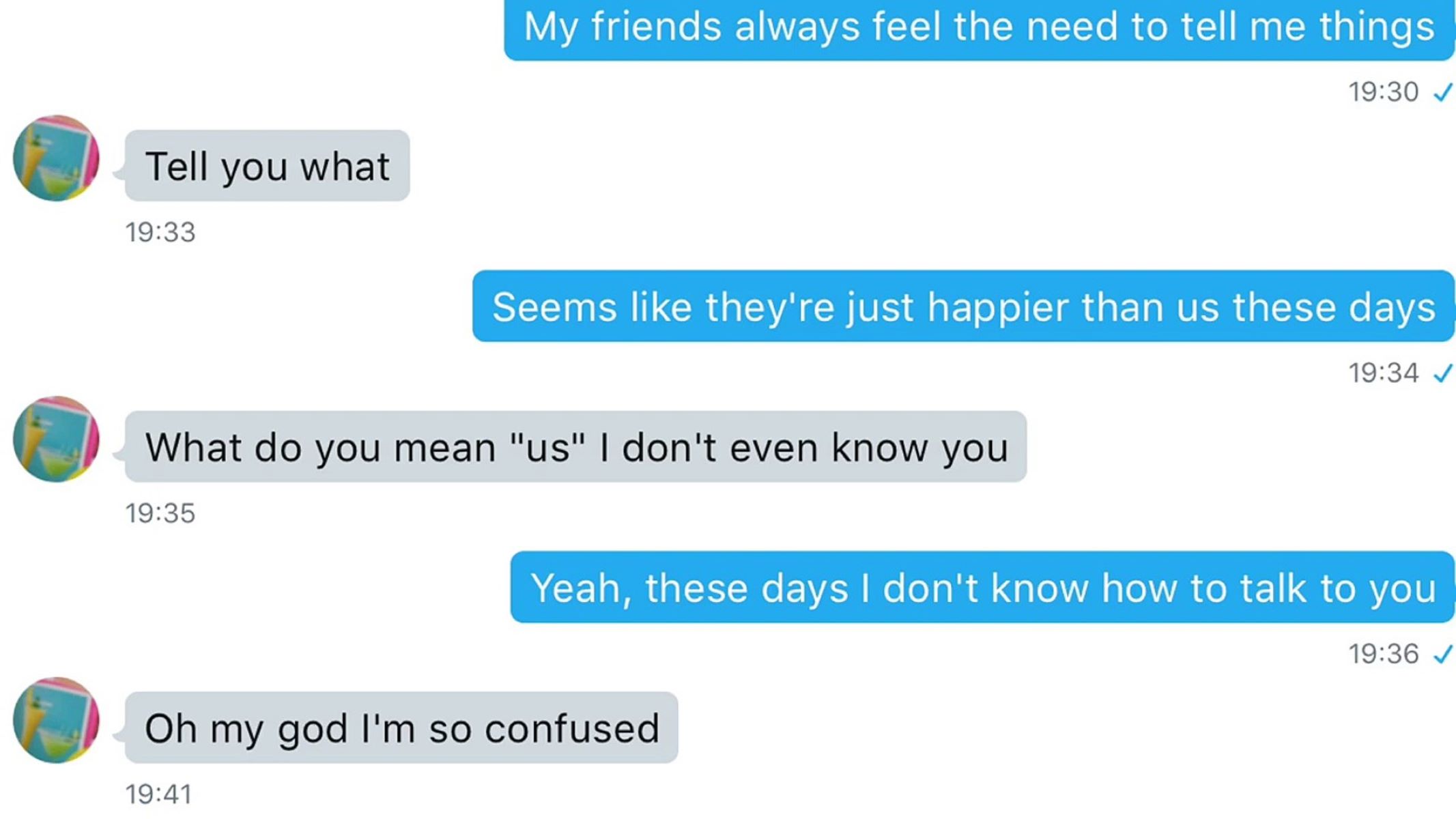Home>Music>Top 10 Powerful Songs Addressing Mental Illness And Suicide


Music
Top 10 Powerful Songs Addressing Mental Illness And Suicide
Published: January 20, 2024
Discover the top 10 powerful songs addressing mental illness and suicide, showcasing the impact of music on mental health awareness and advocacy. Explore how music addresses these sensitive topics and provides solace and understanding.
(Many of the links in this article redirect to a specific reviewed product. Your purchase of these products through affiliate links helps to generate commission for Regretless.com, at no extra cost. Learn more)
Table of Contents
- Introduction
- "1-800-273-8255" by Logic ft. Alessia Cara and Khalid
- "Heavy" by Linkin Park
- "Mad World" by Tears for Fears
- "Man in the Mirror" by Michael Jackson
- "Unwell" by Matchbox Twenty
- "Everybody Hurts" by R.E.M.
- "Hurt" by Johnny Cash
- "The Sound of Silence" by Simon & Garfunkel
- "Boulevard of Broken Dreams" by Green Day
- "Demons" by Imagine Dragons
- Conclusion
Introduction
Music has the remarkable ability to delve into the complexities of the human experience, often addressing sensitive and profound topics with honesty and empathy. In recent years, there has been a notable increase in the number of songs that courageously confront the realities of mental illness and suicide, offering a source of solace and understanding for individuals grappling with these challenges. These powerful compositions not only provide a platform for catharsis but also serve as a reminder that no one is alone in their struggles.
Through poignant lyrics and evocative melodies, these songs resonate deeply with listeners, fostering a sense of connection and empathy. They shed light on the often unspoken battles that individuals face, encouraging open conversations about mental health and the importance of seeking support. Each composition serves as a testament to the resilience of the human spirit and the significance of compassion in navigating the complexities of mental well-being.
In the following sections, we will explore ten profoundly impactful songs that address mental illness and suicide with unwavering honesty and compassion. These songs not only offer a glimpse into the emotional turmoil experienced by individuals but also impart a message of hope and understanding. As we delve into each composition, we will unravel the profound narratives woven into the fabric of these musical masterpieces, acknowledging their ability to spark meaningful conversations and foster a greater understanding of mental health challenges.
From Logic's empowering anthem "1-800-273-8255" to the hauntingly introspective "Mad World" by Tears for Fears, each song encapsulates a unique perspective on the complexities of mental health and the struggles that accompany it. By delving into the emotional landscapes depicted in these compositions, we aim to honor the profound impact of music in amplifying awareness and empathy for those navigating the intricate terrain of mental illness. Let us embark on a journey through these ten powerful songs, each a poignant tribute to the resilience and vulnerability of the human spirit.
Read more: Top 10 Overused EDM Songs In YouTube Videos!
"1-800-273-8255" by Logic ft. Alessia Cara and Khalid
"1-800-273-8255," titled after the National Suicide Prevention Lifeline, is a compelling musical narrative that confronts the harrowing realities of mental health and the profound impact of suicidal ideation. The song serves as an anthem of empowerment and resilience, offering a beacon of hope for individuals grappling with the complexities of mental illness. Through poignant lyrics and a stirring melody, Logic, alongside the soulful vocals of Alessia Cara and Khalid, delivers a message of unwavering support and understanding.
The song unfolds as a heartfelt conversation with a person contemplating suicide, urging them to hold on and seek help. It encapsulates the internal turmoil and desperation often experienced by individuals facing mental health challenges, while also emphasizing the importance of reaching out for assistance. The chorus, "I want you to be alive, you don't gotta die today," echoes a profound plea for perseverance and underscores the value of seeking solace in moments of profound despair.
"1-800-273-8255" transcends the boundaries of a traditional musical composition, as it serves as a poignant reminder of the critical role of compassion and empathy in supporting individuals struggling with mental illness. The song's impact extends beyond its melodic arrangement, as it has been credited with saving lives and sparking vital conversations about mental health awareness and suicide prevention.
By addressing the raw emotions and vulnerabilities associated with mental health challenges, Logic, Alessia Cara, and Khalid have crafted a masterpiece that not only resonates with listeners on a profound level but also fosters a sense of solidarity and understanding. The song's title itself serves as a lifeline, symbolizing the significance of seeking help and finding hope in moments of darkness.
"1-800-273-8255" stands as a testament to the transformative power of music in amplifying awareness and empathy for mental health struggles. It empowers individuals to embrace vulnerability and seek support, dismantling the stigma surrounding mental illness and fostering a community of compassion and understanding. Through this compelling composition, Logic and his collaborators have ignited a vital conversation about the importance of mental health advocacy and the enduring strength found in moments of vulnerability.
This song serves as a poignant reminder that reaching out for help is an act of courage and resilience, and that no one should have to face their battles alone. "1-800-273-8255" stands as a testament to the transformative power of music in amplifying awareness and empathy for mental health struggles. It empowers individuals to embrace vulnerability and seek support, dismantling the stigma surrounding mental illness and fostering a community of compassion and understanding. Through this compelling composition, Logic and his collaborators have ignited a vital conversation about the importance of mental health advocacy and the enduring strength found in moments of vulnerability.
"Heavy" by Linkin Park
"Heavy" by Linkin Park stands as a poignant exploration of the emotional weight and inner turmoil experienced by individuals grappling with mental health challenges. The song, featuring raw and introspective lyrics, delves into the profound sense of burden and vulnerability that accompanies feelings of anxiety and depression. Through a captivating blend of haunting melodies and evocative vocals, Linkin Park offers a poignant portrayal of the complexities of mental illness, resonating deeply with listeners navigating similar struggles.
The opening lines, "I don't like my mind right now, stacking up problems that are so unnecessary," encapsulate the relentless cycle of intrusive thoughts and overwhelming emotions that often characterize mental health challenges. The song adeptly captures the suffocating weight of these internal battles, providing a raw and unfiltered glimpse into the psychological turmoil experienced by individuals confronting their inner demons.
As the chorus unfolds with the poignant declaration, "I'm holding on, why is everything so heavy?," the lyrics encapsulate the profound sense of isolation and emotional burden that accompanies mental illness. The repetition of the word "heavy" serves as a poignant refrain, echoing the relentless struggle and the yearning for relief from the weight of internal turmoil.
Linkin Park's "Heavy" serves as a powerful testament to the emotional complexities of mental health, offering a compelling narrative that resonates with individuals navigating similar challenges. The song's introspective lyrics and captivating melodies provide a source of solace and understanding, fostering a sense of empathy and connection for listeners grappling with their own mental health battles.
Through its unflinching portrayal of vulnerability and emotional turmoil, "Heavy" dismantles the stigma surrounding mental illness, encouraging open conversations about the profound impact of anxiety and depression. The song serves as a poignant reminder of the resilience and strength found in acknowledging one's struggles and seeking support, emphasizing the importance of compassion and empathy in navigating the complexities of mental health.
In essence, "Heavy" by Linkin Park stands as a compelling musical testament to the profound impact of mental health struggles, offering a source of solace and understanding for individuals confronting their inner demons. The song's evocative narrative and haunting melodies serve as a poignant reminder of the enduring strength found in moments of vulnerability, fostering a greater sense of empathy and awareness for the complexities of mental illness.
"Mad World" by Tears for Fears
"Mad World" by Tears for Fears stands as a timeless musical masterpiece that delicately unravels the complexities of the human experience, particularly the pervasive sense of alienation and disillusionment often associated with mental health challenges. The hauntingly introspective composition, characterized by its mesmerizing melody and evocative lyrics, offers a poignant portrayal of the profound emotional landscape traversed by individuals grappling with inner turmoil.
The song opens with the poignant verse, "All around me are familiar faces, worn out places, worn out faces," encapsulating a poignant sense of detachment and disconnection from the world. This introspective narrative delves into the pervasive feelings of isolation and estrangement that often accompany mental health challenges, resonating deeply with listeners who have experienced similar emotional landscapes.
As the song unfolds, the poignant refrain, "The dreams in which I'm dying are the best I've ever had," delicately encapsulates the paradoxical nature of the human psyche, offering a glimpse into the intricate interplay of despair and longing for solace. The hauntingly beautiful melody, coupled with the introspective lyrics, creates a profound sense of empathy and understanding for individuals navigating the complexities of mental illness.
"Mad World" stands as a testament to the enduring impact of music in amplifying awareness and compassion for mental health struggles. Through its evocative narrative and haunting melodies, the song dismantles the stigma surrounding mental illness, fostering open conversations about the profound emotional turmoil experienced by individuals. It serves as a poignant reminder of the significance of empathy and understanding in navigating the intricate terrain of mental health, offering a source of solace and connection for listeners grappling with their own inner demons.
In essence, "Mad World" by Tears for Fears stands as a timeless testament to the profound emotional complexities of the human experience, particularly the pervasive sense of alienation and disillusionment often associated with mental health challenges. The song's evocative narrative and haunting melodies serve as a poignant reminder of the enduring strength found in moments of vulnerability, fostering a greater sense of empathy and awareness for the intricate emotional landscapes traversed by individuals confronting their inner demons.
"Man in the Mirror" by Michael Jackson
"Man in the Mirror" by Michael Jackson stands as a timeless anthem that resonates with profound introspection and a call to personal transformation. The song's compelling narrative and evocative melody converge to deliver a poignant exploration of self-reflection and the enduring impact of individual actions on the world. Through its introspective lyrics and stirring vocals, "Man in the Mirror" serves as a compelling testament to the significance of personal accountability and the potential for positive change.
The song opens with the poignant verse, "I'm starting with the man in the mirror, I'm asking him to change his ways," encapsulating a profound plea for self-examination and inner growth. Michael Jackson's impassioned delivery infuses the lyrics with a sense of urgency and conviction, compelling listeners to confront their own actions and embrace the potential for personal transformation. The chorus, with its resounding declaration of "If you wanna make the world a better place, take a look at yourself and make a change," serves as a compelling call to action, emphasizing the transformative power of individual accountability in shaping a more compassionate and empathetic world.
"Man in the Mirror" transcends the boundaries of a traditional musical composition, as it serves as a poignant reminder of the profound impact of self-reflection and personal growth. The song's universal message resonates deeply with listeners, fostering a sense of empathy and understanding for the complexities of personal change and the enduring potential for positive impact. Through its evocative narrative and stirring melodies, "Man in the Mirror" encourages individuals to embrace introspection and recognize the profound significance of their actions in shaping the world around them.
In essence, "Man in the Mirror" by Michael Jackson stands as a timeless testament to the enduring impact of personal accountability and the potential for positive change. The song's evocative narrative and stirring vocals serve as a poignant reminder of the transformative power of self-reflection and the enduring potential for individuals to shape a more compassionate and empathetic world. Through this compelling composition, Michael Jackson ignites a vital conversation about the significance of personal growth and the enduring strength found in moments of introspection.
"Unwell" by Matchbox Twenty
"Unwell" by Matchbox Twenty stands as a captivating musical portrayal of the intricate emotional landscape traversed by individuals grappling with mental health challenges. The song delicately unravels the complexities of internal turmoil, offering a poignant narrative that resonates deeply with listeners navigating similar struggles.
The opening verse, "All day staring at the ceiling, making friends with shadows on my wall," encapsulates the pervasive sense of introspection and isolation often experienced by individuals contending with mental illness. The lyrics adeptly capture the profound emotional weight and the relentless cycle of intrusive thoughts that characterize the internal battles faced by those confronting their inner demons.
As the song unfolds, the poignant chorus, "I'm not crazy, I'm just a little unwell," delicately encapsulates the nuanced experience of grappling with mental health challenges while seeking validation and understanding. Matchbox Twenty's evocative portrayal of vulnerability and resilience fosters a profound sense of empathy and connection, offering solace and validation for individuals navigating their own emotional landscapes.
"Unwell" serves as a powerful testament to the enduring impact of music in amplifying awareness and compassion for mental health struggles. Through its introspective narrative and emotive melodies, the song dismantles the stigma surrounding mental illness, fostering open conversations about the profound emotional turmoil experienced by individuals. It stands as a poignant reminder of the enduring strength found in moments of vulnerability, fostering a greater sense of empathy and awareness for the intricate emotional landscapes traversed by individuals confronting their inner demons.
In essence, "Unwell" by Matchbox Twenty stands as a timeless testament to the profound emotional complexities of the human experience, particularly the pervasive sense of introspection and resilience often associated with mental health challenges. The song's evocative narrative and emotive melodies serve as a poignant reminder of the enduring strength found in moments of vulnerability, fostering a greater sense of empathy and awareness for the complexities of mental illness.
"Everybody Hurts" by R.E.M.
"Everybody Hurts" by R.E.M. stands as a timeless anthem that tenderly acknowledges the profound emotional struggles experienced by individuals, offering solace and empathy through its evocative narrative and stirring melody. The song delicately unravels the complexities of pain and despair, serving as a poignant reminder of the enduring strength found in moments of vulnerability.
The opening verses, "When your day is long and the night, the night is yours alone, when you're sure you've had enough of this life, well hang on," encapsulate a profound plea for perseverance and resilience in the face of overwhelming emotional turmoil. R.E.M.'s poignant portrayal of the internal battles faced by individuals grappling with despair fosters a profound sense of empathy and understanding, offering a source of solace and validation for listeners navigating their own emotional landscapes.
As the song unfolds, the chorus, with its resounding declaration of "Everybody hurts, take comfort in your friends," serves as a compelling reminder of the significance of seeking support and compassion in moments of profound despair. The emotive melody and introspective lyrics create a profound sense of connection, fostering a greater understanding of the universal nature of pain and the enduring potential for solace found in human connection.
"Everybody Hurts" transcends the boundaries of a traditional musical composition, as it serves as a poignant reminder of the enduring impact of empathy and understanding in navigating the complexities of emotional struggles. The song's universal message resonates deeply with listeners, fostering a sense of solidarity and compassion for the profound emotional challenges faced by individuals. Through its evocative narrative and stirring melodies, "Everybody Hurts" encourages individuals to embrace vulnerability and seek solace in the presence of empathetic support.
In essence, "Everybody Hurts" by R.E.M. stands as a timeless testament to the profound emotional complexities of the human experience, particularly the enduring potential for solace and understanding in moments of despair. The song's evocative narrative and stirring melody serve as a poignant reminder of the enduring strength found in moments of vulnerability, fostering a greater sense of empathy and awareness for the intricate emotional landscapes traversed by individuals confronting their inner demons.
"Hurt" by Johnny Cash
"Hurt" by Johnny Cash stands as a hauntingly introspective musical masterpiece that delves into the profound complexities of emotional turmoil and introspection. Originally written and performed by Trent Reznor of Nine Inch Nails, Cash's rendition of "Hurt" infuses the composition with a raw and poignant vulnerability, offering a deeply personal exploration of regret, resilience, and the enduring impact of life's experiences.
The song opens with the evocative verse, "I hurt myself today, to see if I still feel, I focus on the pain, the only thing that's real," encapsulating a poignant glimpse into the depths of emotional anguish and introspection. Cash's weathered vocals infuse the lyrics with a sense of profound introspection, inviting listeners into a deeply personal journey of self-examination and contemplation. The haunting melody and stripped-down arrangement create an atmosphere of raw vulnerability, fostering a profound sense of empathy and connection with the emotional landscape traversed by the song.
As "Hurt" unfolds, the chorus, with its resounding declaration of "What have I become, my sweetest friend, everyone I know goes away in the end," delicately unravels the complexities of regret and the enduring impact of life's experiences. Cash's emotive delivery infuses the lyrics with a sense of profound introspection, inviting listeners into a deeply personal journey of self-examination and contemplation. The haunting melody and stripped-down arrangement create an atmosphere of raw vulnerability, fostering a profound sense of empathy and connection with the emotional landscape traversed by the song.
"Hurt" by Johnny Cash transcends the boundaries of a traditional musical composition, as it serves as a poignant reminder of the enduring impact of introspection and the profound emotional weight of life's experiences. The song's universal message resonates deeply with listeners, fostering a sense of empathy and understanding for the complexities of regret and resilience. Through its evocative narrative and haunting melody, "Hurt" encourages individuals to embrace vulnerability and acknowledge the profound impact of life's experiences on personal growth and introspection.
In essence, "Hurt" by Johnny Cash stands as a timeless testament to the enduring emotional complexities of the human experience, particularly the profound impact of regret and introspection. The song's evocative narrative and haunting melody serve as a poignant reminder of the enduring strength found in moments of vulnerability, fostering a greater sense of empathy and awareness for the intricate emotional landscapes traversed by individuals confronting their inner demons.
"The Sound of Silence" by Simon & Garfunkel
"The Sound of Silence" by Simon & Garfunkel stands as a timeless musical masterpiece that delicately unravels the profound emotional complexities of solitude and introspection. The hauntingly evocative composition, characterized by its mesmerizing melody and poignant lyrics, offers a poignant portrayal of the human experience, particularly the pervasive sense of isolation and contemplation often associated with mental health challenges.
The song opens with the iconic verse, "Hello darkness, my old friend, I've come to talk with you again," encapsulating a profound sense of introspection and the enduring presence of inner contemplation. The lyrics adeptly capture the pervasive feelings of solitude and the intricate interplay of silence and reflection, resonating deeply with listeners who have experienced similar emotional landscapes.
As the song unfolds, the chorus, with its resounding declaration of "And in the naked light, I saw ten thousand people, maybe more," delicately encapsulates the paradoxical nature of solitude and the profound impact of introspection on the human spirit. Simon & Garfunkel's emotive portrayal of vulnerability and resilience fosters a profound sense of empathy and connection, offering solace and validation for individuals navigating their own emotional journeys.
"The Sound of Silence" serves as a powerful testament to the enduring impact of music in amplifying awareness and compassion for mental health struggles. Through its introspective narrative and haunting melodies, the song dismantles the stigma surrounding solitude and introspection, fostering open conversations about the profound emotional turmoil experienced by individuals. It stands as a poignant reminder of the enduring strength found in moments of vulnerability, fostering a greater sense of empathy and awareness for the intricate emotional landscapes traversed by individuals confronting their inner demons.
In essence, "The Sound of Silence" by Simon & Garfunkel stands as a timeless testament to the profound emotional complexities of the human experience, particularly the pervasive sense of solitude and contemplation often associated with mental health challenges. The song's evocative narrative and haunting melodies serve as a poignant reminder of the enduring strength found in moments of vulnerability, fostering a greater sense of empathy and awareness for the intricate emotional landscapes traversed by individuals confronting their inner demons.
"Boulevard of Broken Dreams" by Green Day
"Boulevard of Broken Dreams" by Green Day stands as a poignant anthem that encapsulates the profound emotional journey of solitude and introspection. The song's evocative narrative and haunting melody converge to deliver a compelling portrayal of the complexities of navigating the solitary pathways of life. As the opening chords resonate, the listener is enveloped in a sense of introspection and contemplation, embarking on a profound exploration of the human experience.
The opening verse, "I walk a lonely road, the only one that I have ever known," delicately encapsulates the pervasive sense of solitude and the enduring journey of self-discovery. Green Day's emotive portrayal of vulnerability and resilience fosters a profound sense of empathy and connection, offering solace and validation for individuals navigating their own emotional landscapes. The haunting melody and introspective lyrics create an atmosphere of raw vulnerability, inviting listeners to embark on a deeply personal journey of introspection.
As the song unfolds, the chorus, with its resounding declaration of "I walk alone, I walk alone," delicately unravels the complexities of solitude and the profound impact of introspection on the human spirit. The emotive delivery infuses the lyrics with a sense of profound introspection, inviting listeners into a deeply personal exploration of self-discovery and contemplation. "Boulevard of Broken Dreams" serves as a powerful testament to the enduring impact of music in amplifying awareness and compassion for the emotional complexities of solitude and introspection.
In essence, "Boulevard of Broken Dreams" by Green Day stands as a timeless testament to the profound emotional complexities of the human experience, particularly the enduring journey of self-discovery and introspection. The song's evocative narrative and haunting melody serve as a poignant reminder of the enduring strength found in moments of vulnerability, fostering a greater sense of empathy and awareness for the intricate emotional landscapes traversed by individuals confronting their inner demons.
"Demons" by Imagine Dragons
"Demons" by Imagine Dragons stands as a profound musical exploration of the internal struggles and emotional vulnerabilities that individuals often grapple with in the face of mental health challenges. The song, characterized by its evocative lyrics and stirring melody, offers a poignant portrayal of the complexities of confronting one's inner demons and the enduring resilience found in moments of vulnerability.
The opening verse, "When the days are cold and the cards all fold, and the saints we see are all made of gold," delicately encapsulates the pervasive sense of emotional turmoil and the enduring battle against inner struggles. Imagine Dragons' emotive portrayal of vulnerability and resilience fosters a profound sense of empathy and connection, offering solace and validation for individuals navigating their own emotional landscapes. The haunting melody and introspective lyrics create an atmosphere of raw vulnerability, inviting listeners to embark on a deeply personal journey of self-reflection and introspection.
As the song unfolds, the chorus, with its resounding declaration of "Don't get too close, it's dark inside, it's where my demons hide," delicately unravels the complexities of inner turmoil and the enduring impact of confronting one's emotional vulnerabilities. The emotive delivery infuses the lyrics with a sense of profound introspection, inviting listeners into a deeply personal exploration of self-discovery and contemplation. "Demons" serves as a powerful testament to the enduring impact of music in amplifying awareness and compassion for the emotional complexities of confronting one's inner struggles.
In essence, "Demons" by Imagine Dragons stands as a timeless testament to the profound emotional complexities of the human experience, particularly the enduring journey of self-discovery and introspection. The song's evocative narrative and haunting melody serve as a poignant reminder of the enduring strength found in moments of vulnerability, fostering a greater sense of empathy and awareness for the intricate emotional landscapes traversed by individuals confronting their inner demons.
Conclusion
In exploring these ten powerful songs addressing mental illness and suicide, we have embarked on a profound journey through the intricate emotional landscapes traversed by individuals confronting their inner demons. Each composition stands as a poignant testament to the enduring impact of music in amplifying awareness and compassion for the complexities of mental health struggles. From Logic's empowering anthem "1-800-273-8255" to the haunting introspection of Johnny Cash's "Hurt," these songs offer a compelling narrative that resonates deeply with listeners, fostering a sense of empathy and understanding for those grappling with their own mental health challenges.
These musical masterpieces serve as a reminder of the resilience and vulnerability of the human spirit, offering solace and validation for individuals contending with the profound emotional weight of anxiety, depression, and suicidal ideation. Through evocative narratives and stirring melodies, these songs dismantle the stigma surrounding mental illness, encouraging open conversations about the impact of emotional turmoil and the enduring strength found in moments of vulnerability.
As we reflect on the profound impact of these compositions, it becomes evident that music serves as a powerful vehicle for fostering empathy and understanding for the complexities of mental health. The universal messages woven into these songs transcend barriers, resonating with individuals from all walks of life and offering a source of solace and connection in moments of despair.
Ultimately, these songs stand as a testament to the transformative power of music in amplifying awareness and empathy for mental health struggles. They empower individuals to embrace vulnerability, seek support, and dismantle the stigma surrounding mental illness. Through their compelling narratives and evocative melodies, these compositions ignite vital conversations about the enduring strength found in moments of introspection and the importance of compassion in navigating the complexities of mental well-being.
As we conclude this exploration, it is evident that these songs not only offer a glimpse into the emotional turmoil experienced by individuals but also impart a message of hope and understanding. They serve as a poignant reminder that no one is alone in their struggles and that seeking support is an act of courage and resilience. These ten powerful songs stand as a testament to the enduring strength found in moments of vulnerability, fostering a greater sense of empathy and awareness for the intricate emotional landscapes traversed by individuals confronting their inner demons.













